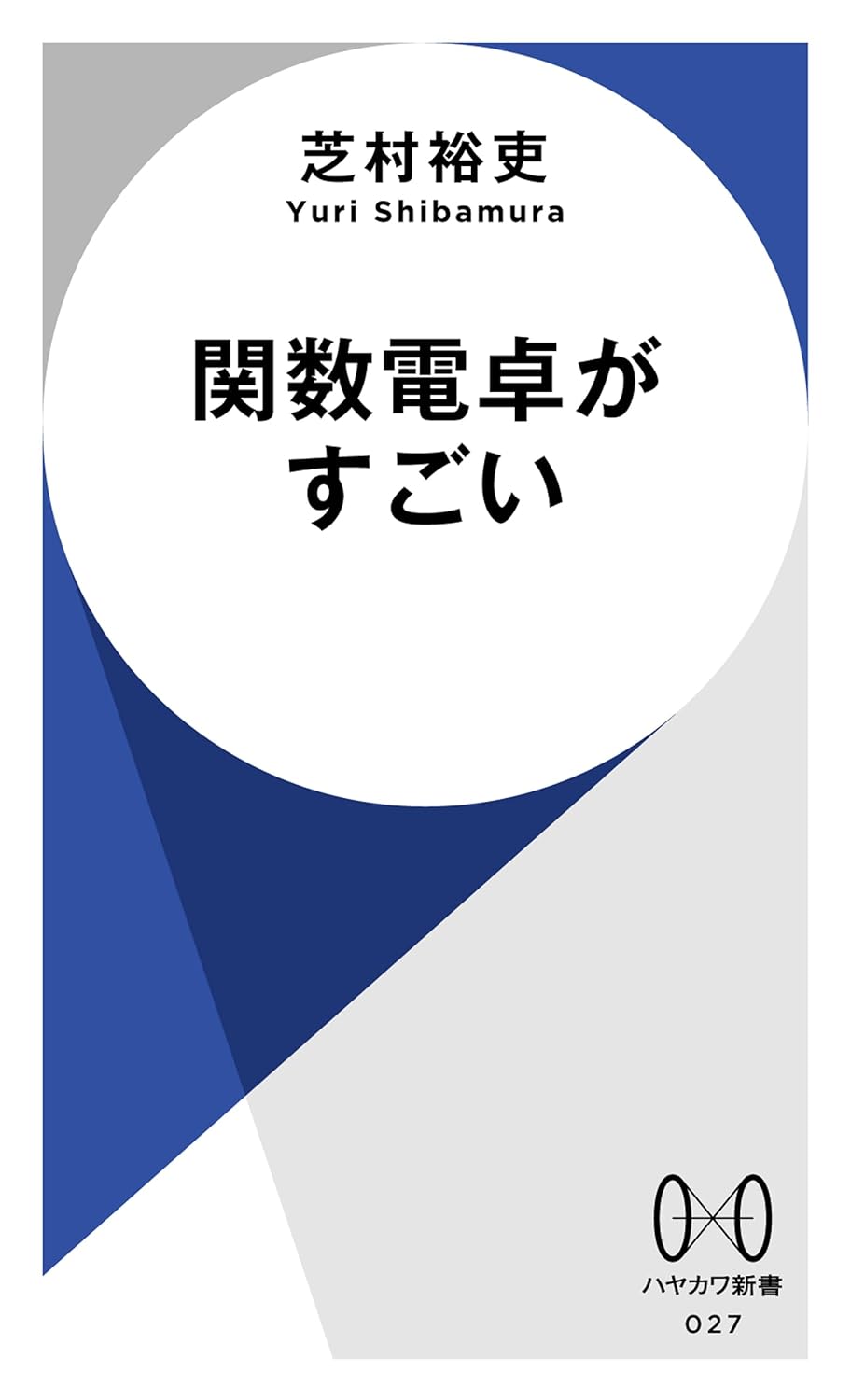芝村 裕吏さんの「関数電卓がすごい」を図書館から借りてきました。時折、摘み読みをしています。
I borrowed Yuuri Shibamura’s Kansu Dentaku ga Sugoi (“Scientific Calculators Are Amazing”) from the library. I occasionally dip into it.

これ、私の担当している連載の内容とよく似ています。『日常を数字で理解しよう』という趣旨の本であると理解しました。
This book is quite similar to the series I am writing. I understood it as a book with the theme, “Let’s understand everyday life through numbers.”
『この方の著書は、(私(江端)には)基本的に"外れ"がない』のですが、なんとなく理由が分かってきました。物語の中に、"根拠のある定量化"がなされているからだと思います。
For me, Shibamura’s books are never a “miss,” and I think I now understand why. It is because they always contain “quantification with solid grounds” within the narrative.
「マージナルオペレーション」にしても、「富士学校まめたん研究分室」にしても、根拠のある金額や距離や時間が示されて、それが物語に"リアル"を与えているのだと思いました。
Whether it is a Marginal Operation or a Fuji School Mametan Research Annex, the presentation of justified figures, costs, distances, or times? Gives the story its sense of realism.
ただ、この本は、私には「アタリ」ですが、多くの日本人にとっては「ハズレ」か「どうでもいい」内容だと思うのです。
That said, while this book is a “hit” for me, I suspect that for many Japanese readers it would be a “miss” or “irrelevant.”
なぜ、そう思うか。
Why do I think so?
私の連載「数字で世界を回してみよう」も、正直、あまり『大衆ウケ』していない、と思うからです。
Because my own series “Let’s Run the World with Numbers” is, to be honest, not particularly popular with the general public.
多くの人は、計算しようとしません。計算が苦手だと決めつけて、計算する前に逃げてしまいます。
Most people avoid doing calculations. They assume they are bad at it and run away before even trying.
『知りたい』という欲望を、もう一段階上げて『定量化してみたい』に至る人は、残念ながらかなりの少数派と言えそうです。
Those who raise their curiosity one level further?from simply “wanting to know” to “wanting to quantify”?are, unfortunately, a very small minority.
私の場合、興味のあることの"定量化"にはパソコンを使いますが、関数電卓はポケットに入る手軽さです。
In my case, I use a computer to quantify the things I’m interested in, but a scientific calculator has the advantage of fitting easily in a pocket.
『文庫本を読むかわりに、関数電卓でサクっと計算ができる』というのは、私にはとても楽しいことのように思えますが ―― これを楽しいと思える人は、一体どれだけいるのか、と考えると、かなり難しいと思います。
To me, the idea of “doing quick calculations on a scientific calculator instead of reading a paperback” sounds delightful, but when I ask myself how many others would find that enjoyable, I realize the answer is: very few.
-----
東野圭吾さんの著書で映画にもなった『容疑者Xの献身』では、主人公が留置場に入った際、外部との接触もなくやることもない状況で、彼は「四色問題」を思索の題材に選びます。
In Keigo Higashino’s novel The Devotion of Suspect X, later made into a film ? The protagonist, while in a detention cell with no outside contact and nothing to do, chooses the “four-color problem” as the subject of his contemplation.
『任意の地図を四色だけで塗り分けられるか、という未解決問題をひたすら頭の中で追いかけ続ければ、たとえ一生この場から出られなくても退屈せずに過ごせる』と考えるシーンが出てきます。
There is a scene where he thinks: “If I keep chasing in my mind this unsolved problem, whether any map can be colored using only four colors? I could live here for the rest of my life without ever being bored.”
(*)ちなみに4色問題は、1976年にアッペルとハーケンによって証明済みですが、コンピュータによる証明であり、いわゆる紙と鉛筆による証明はされていません。そのため現在でも四色問題は“数学的に特異な証明例”とされています。
(*)Incidentally, the four-color problem was proven in 1976 by Appel and Haken, but their proof relied on computers; no traditional “paper-and-pencil” proof exists. For this reason, it is still regarded today as a mathematically unusual example of a proof.
この感覚、私にはよく分かるのです。
I can understand this feeling very well.
私の場合は「パソコンがあれば」となり、芝村 裕吏さんの場合は「関数電卓があれば」となるのでしょう。
For me, it would be “as long as I have a computer,” and for Yuuri Shibamura, it would be “as long as I have a scientific calculator.”
そういう観点では、数字や数学というのは、かなり高度な「娯楽」ですが、これを共有できる人間が恐しく少ない、というのも事実で ―― これはどうしようもありません。
From this perspective, numbers and mathematics are a relatively advanced form of “entertainment.” Yet the reality is that very few people can share in this enjoyment, and that cannot be helped.
-----
この本の最後の方に、戦国時代の「15万人を動員する戦(いくさ)」に関わる戦費の計算がされています。これだけを読んでも、「戦争はアホらしくてやってられない」ことが分かります。
Toward the end of this book, there is a calculation of the war expenses involved in mobilizing 150,000 soldiers during the Sengoku period. Just reading that makes it clear how absurd and unsustainable war really is.
逆に、戦争を経済活動のプラットフォームとして定着させてしまうと、戦争をしていないと国家運営が成り立たないことも分かってきます。
Conversely, once war is entrenched as a platform for economic activity, it becomes apparent that the state cannot function without being engaged in some form of conflict.
豊臣秀吉の朝鮮出兵などは、その典型例ですし、三国志などを読んでいると『戦費を内需拡大に回せばいいのに』と思います。赤壁の戦いなどで戦費計算すると気が遠くなるような金額になります。
Toyotomi Hideyoshi’s invasions of Korea are a classic example. And when reading Romance of the Three Kingdoms, I often think, “Why not channel those war expenses into domestic growth instead?” The cost of battles like Red Cliffs, if calculated, would amount to astronomical sums.
-----
そういう観点で言えば、日本国憲法の唱える"戦争放棄"の概念は、人道だけではなく、経済の観点からも優れていると言えます。
From this perspective, the Japanese Constitution’s principle of “renouncing war” is excellent not only from a humanitarian standpoint but also from an economic one.
まあ、日本は他国の戦争特需で経済発展してきた国ですが、そういう意味では、「自国は"戦争放棄"」で「他国の戦争には口出ししない」という姿勢は、なかなか狡猾な平和戦略とも言えるのではないか、と思うことがあります。
Of course, Japan itself developed economically through the war booms of other nations. In that sense, the stance of “renouncing war for ourselves” while “not interfering in others’ wars” could be seen as a rather cunning peace strategy.
『戦後80年、我が国日本が、平和憲法にもとづく理念に基づき、80年間という長期の平和を維持し続けてきた「真っ白な手」をしている』――そんな寝惚けた戯言を語るつもりはありません。